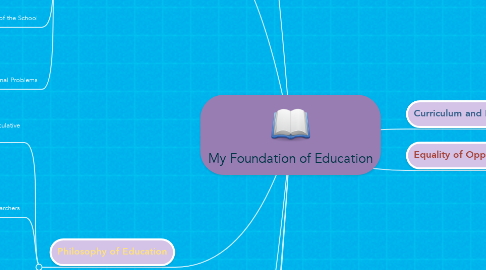
1. Politics of Education
1.1. Purposes of Education
1.1.1. Political: to inculate allegiance to the existing political order (patriotism); to prepare citizens who will participate in this political order (political demacracies); to help assimilate diverse cultural groups into a common political order; and to teach children the basic laws of the society
1.1.2. Social: to help solve social problems; to work as one of many institutions, such as family and church to ensure social cohesion; and to socialize children into the various roles, behaviors, and values of society.
1.1.3. Economic: to prepare students for their later occupational roles and to select, train, and allocate individuals into the division of labor
1.1.4. Intellectual: to teach basic cognitive skills such as reading, writing, and mathematics; to transmit specific knowledge, and to help students acquire higher-order thinking skills such as analysis, evaluation, and synthesis
1.2. Unequal Performance
1.2.1. The liberal perspective shows the individuals or groups of certain students begin school with certain advantages or disadvantages compared to peers. This is believed to happen due to life chances. The belief that policies and programs should be put into place to make education an equal playing field for all.
1.3. Role of the School
1.3.1. The conservative perspective shows that the role of schools is for all students to be given the opportunity to complete individually in education. Schools should reward individual efforts. With this perspective, schools should provide a place for "individual merit to be encouraged and rewarded."
1.4. Educational Problems
1.4.1. Conservatives define educational problems as the decline of standards, cultural literacy, values, civilization, and authority. Schools are said to be "stifled by bureaucracy and inefficiency."
2. Philosophy of Education
2.1. PRAGMATISM: Problem---->speculative thought---->action ---->results
2.2. Key Researchers
2.2.1. 1. George Sanders Peirce
2.2.2. 2. William James
2.2.3. 3. John Dewey
2.2.4. 4. Frances Bacon
2.2.5. 5. John Locke
2.2.6. 6. Jean Jacques Rousseay
2.3. Goal: providing students with how to improve the social order
2.4. Role of teacher: assume the peripheral position of facilitator
2.5. Instruction methods: individually and groups. Use problem solving or inquiry method
2.6. Curriculum: integrated curriculum where students go from the known to the unknown
3. History of U.S. Education
3.1. The Education for Women reform movement forever influenced education. This movement helped others to see that an education was not harmful to women as always believed. By the 19th Century, education was no longer an incomprehensible idea. It was actually achievable. Women were finally taught with the same curriculum as men.
3.2. The Democratic-Liberal School is a historical interpretation of U.S. Education. Here, it is believed that school systems must provide an equal opportunity for all students. Ellwood Cubberly and Merle Curti, both Historians in their time, saw this democratic movement as the "first step in opening U.S. education to all." This view shows education as now being more diverse both socially and intellectually. Lawrence A. Cremin published in his book "Popular Education" that "it provides a place for everyone."
4. Sociological Perspectives
4.1. Theoretical Perspectives
4.1.1. Functionalism: the ways that societal and institutional forces create a collective conscience based on shared values
4.1.2. Conflict theory: social order is based on the ability of dominant groups to impose their will on subordinate groups through force, cooptation, and manipulation
4.1.3. Interactionalism: attempt to make the commonplace strange by turning on their heads everyday taken-for-granted behaviors and interactions between students and students, and between students and teachers
4.2. 5 Effects of Schooling (that have greatest impact)
4.2.1. 1. Employment-college graduates have greater employment opportunites
4.2.2. 2. Knowledge : people with more education tend to read more and take part in politics and public affairs.
4.2.3. 3. Attitude: People with a higher education have a greater sense of well-being and higher self-esteem
4.2.4. 4. Education: Public and private schools both allow students to often receive the same type of education, however; private schools can be seen as a more prestigious educational route
4.2.5. 5. Mobility: People believe that education leads to social and economic mobility

